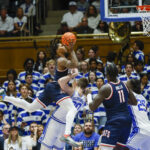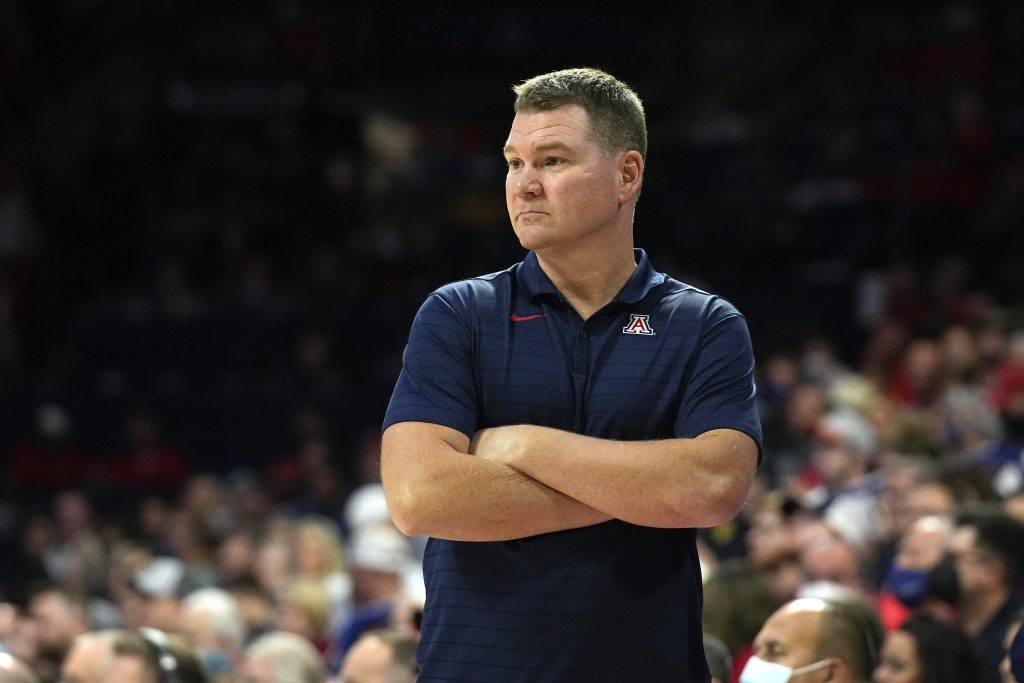The best basketball rivalry in the Pac-12 is back, and its resurgence includes the full arsenal of fan frustration, social media sniping, conspiracy theories, and, lest we forget, two top-10 teams.
It seems Arizona supporters are miffed that the postponed showdown against UCLA won’t take place this weekend even though the Bruins are back from their multi-week COVID pause and both teams have openings on the calendar.
Some believe the rust-filled Bruins, who scheduled Long Beach State instead, are ducking Arizona with protection from the conference office.
We have a few thoughts on the matter, of course, starting with this: It’s good to see the Arizona-UCLA rivalry back with a bite.
Pac-12 basketball is far more interesting when the Bruins and Wildcats are top-10 teams, their head-to-head matchups are meaningful nationally and their fans are chirping at each other.
The conference needs this level of energy and engagement, however misguided it might be.
And in this case, it’s fairly misguided.
The notion that UCLA coach Mick Cronin, who scheduled Villanova, Gonzaga and North Carolina this season — and whose veteran roster is nine months removed from playing one of the greatest Final Four games of all time — would duck anybody strikes us as comical.
But the notion that the Pac-12 would postpone the game until the Bruins have shed their rust makes all the sense in the world.
First, some background on the process behind COVID pauses and the rescheduling of games.
We’ll use the Bruins as an example.
Once they fell below the threshold of healthy players in mid-December — through some combination of symptomatic cases, positive test results of asymptomatic cases, and contact tracing — the Bruins notified the conference office.
They also submitted a written statement, signed by a medical official, that confirmed the team was under the number of players required to compete. (That step in the Pac-12 process prevents head coaches from engaging in gamesmanship.)
At that point, the conference office took charge of rescheduling the game, based on authority granted by the athletic directors.
The Pac-12 takes a variety of issues into account when identifying dates for make-up games, including:
— The likely return-to-play date, and necessary ramp-up time, for the team on pause.
— The operational pressures on the host schools, such as other events scheduled for the arena.
— The needs of the Pac-12’s media partners (ESPN, Fox and the Pac-12 Networks), which are struggling to find production crews because of current COVID cases and experienced hands leaving the profession.
As it moves the pieces on the chessboard, the conference office considers one factor above all others:
What logistical outcome best helps the Pac-12 place the most teams into the NCAA Tournament with the highest seeds possible.
(Everything about Pac-12 basketball operations, both in-season and out of season, is viewed with that strategic goal in mind.)
The conference office has the benefit of last season’s disruption to help navigate the current turbulence. Once omicron began rippling through teams and postponing games, the Pac-12 simply dusted off the COVID playbook from last year.
And why not? Despite all the chaos, the Pac-12 was able to play 126 out of 130 games and keep teams fresh enough for four of them to reach the Sweet 16.
OK, so why wouldn’t the conference direct UCLA, which is finally healthy, to play Arizona this weekend?
All indications suggest the Bruins were willing.
“I know it would be a loss but I’d take the Lakers at this point because our guys want to play,” Cronin told reporters this week.
From here, the answer’s clear:
It doesn’t serve the Pac-12 basketball brand, or help the conference meet its strategic goal, to match the Bruins against Arizona — blue blood against blue blood, No. 5 against No. 8 — when one of them hasn’t played a game in four weeks.
And for much of that time, the Bruins couldn’t even practice.
They are, effectively, starting over.
If the conference office wants a showcase game that pairs its best programs, raises the Pac-12’s basketball profile and impresses the NCAA Tournament selection committee, this is not the right time for tipoff.
It’s the most valuable game of the season, the Pac-12’s Ace of Spades. You don’t play that card when one team hasn’t competed in 20-something days. It would be operational mismanagement.
Key point: The same process would apply if the situation were reversed. If Arizona had been on COVID pause for four weeks, asking the rust-filled Wildcats to play fully-ramped UCLA would be malpractice, as well.
And from the standpoint of brand enhancement, it makes no sense to match top-10 teams in Pauley Pavilion when only families are allowed to attend UCLA games (because of the COVID spike).
Both the Pac-12 and ESPN want the highest level of competition, first-rate entertainment, a packed arena and, ideally, a game that goes to the wire.
It simply wouldn’t be a spectacle if they played this weekend.
Once the Pac-12 decided to postpone the game, the Bruins received approval to schedule Long Beach State — now healthy, they need to play somebody.
Arizona fans have argued that because of COVID uncertainty, any conference game that can get played should get played. There’s no guarantee a window will open to reschedule the game later in the season.
That’s a reasonable concern, especially given the potential for Arizona to experience a COVID pause at some point.
But if that proves the case, the Wildcats likely would miss only one or two weeks, leaving plenty of time to find a date for the game.
The odds are heavily in the Pac-12’s favor that the showdown could be slotted into a workable window on a Monday or Tuesday — it’s only a one-hour flight between Tucson and L.A. — or that it will replace other games that end up being canceled or postponed.
Again, recall last year: The handful of Pac-12 games that never got played were of limited significance for the conference race or NCAA Tournament seeds.
The games that matter most, and none matters more this season than Arizona-UCLA, will be slotted into the rotation somewhere without one team being placed at a significant competitive disadvantage.
Our advice to fans is to settle down, forget the conspiracies, know that the conference would treat Arizona the same way it’s treating UCLA and appreciate the rivalry once again rising to a level that generates outrage.
Support the Hotline: Receive three months of unlimited access for just 99 cents. Yep, that’s 99 cents for 90 days, with the option to cancel anytime. Details are here, and thanks for your support.
*** Send suggestions, comments and tips (confidentiality guaranteed) to pac12hotline@bayareanewsgroup.com or call 408-920-5716
*** Follow me on Twitter: @WilnerHotline
*** Pac-12 Hotline is not endorsed or sponsored by the Pac-12 Conference, and the views expressed herein do not necessarily reflect the views of the Conference.
Related posts:

(AP Photo/Rick Scuteri)
Reactions to Pac-12 2022 Football Schedule Release Wilner – Arizona, ASU search for new athletic directors: For both schools, challenges looms as college sports prepare for a new era
Wilner – Arizona, ASU search for new athletic directors: For both schools, challenges looms as college sports prepare for a new era

(AP Photo/Nell Redmond)
Pac-12 MBB: The Hotline’s picks for postseason awards and all-conference selections
FILE - Washington quarterback Michael Penix Jr. l (AP Photo/Stephen Brashear, File)
NFL Draft preview: Pac-12 poised for three stellar days before it fades to blackJon Wilner
Jon Wilner has been covering college sports for decades and is an AP top-25 football and basketball voter as well as a Heisman Trophy voter. He was named Beat Writer of the Year in 2013 by the Football Writers Association of America for his coverage of the Pac-12, won first place for feature writing in 2016 in the Associated Press Sports Editors writing contest and is a five-time APSE honoree.
